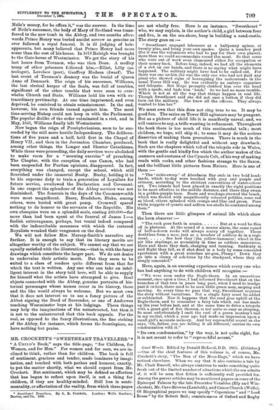MR. CROCKETT'S "SWEETHEART TRAVELLERS."* '• A CHILD'S Book," says the
title-page, "for Children, for Women, and for Men." For women and for men, we are in- clined to think, rather than for children. The book is full of sentiment, gracious and tender, made luminous by imagi- nation, and touched with both pathos and humour, exactly, to put the matter shortly, what we should expect from Mr. Crockett. But sentiment, which may be defined as affection that has begun to reflect upon itself, is not a thing for children, if they are healthy-minded. Still less is senti- mentality, or affectation of the reality, from which these pages
• Sweetheart Traveltera. By G. B. Crockett. London: Wells Gardner, Barton, and Co. 1895.
are not wholly free. Here is an instance. " Sweetheart " who, we may explain, is the author's child, a girl between four and five, is on the sea-shore, busy in building a sand-castle. The story goes on :—
"Sweetheart engaged labourers at a halfpenny apiece, or twenty pins, and bring your own spades. Quite a number paid (for it was the volunteers who had to pay for their own places), more than we could accommodate round the most. So that some who were out of work even clamoured either for occupation or their money back. Before long, indeed, we had all the elements of a riot on our hands, and there is no saying what might have happened. The military might have had to be called out. For there was one urchin (he was the only one who had not paid any pins) who showed signs of haranguing the malcontents in the usual Tower Hill way. He was evidently an embryo organiser and delegate. But Hugo promptly clubbed him over the head with a spade, and bade him hush.' So we had no more trouble. Which is not at all the way that things happen in real life. Though Sweetheart said she did not care a button if they did turn out the military. She knew all the officers. They always wanted to kiss her."
We must own that this does not ring true to us. It may be good fun. The satire on Tower Hill agitators may be pungent. But as a picture of child life it is manifestly unreal, and, we will venture to say, a trifle wanting in refinement. Throughout the book there is too much of this sentimental talk ; most children, we hope, will skip it ; to some it may do the serious disservice of making them precocious. There is much in the book that is really delightful and without any drawback. Such are the chapters which tell of the tricycle ride in Wales, with the gentle and kindly fun which the author makes of the manners and oustoms of the Cymric Celt, of his way of making roads with rocks, and other fashions strange to the Saxon, and the brilliant little pictures from Nature. Here is one of them :—
" The sicke-sweep ' of Aberdaron Bay ends in two bold head- lands, which to-day were touched with grey and purple and crimson, according to the strictest conventions of water-colour art. Two islands had been placed in exactly the right positions to be most effective in the middle distance, and there they swam in a golden-purple haze. Boats and wreckage strewed the beach. which was flecked with magnificently coloured pebbles, some red as blood, others splashed with orange and lilac and green. Pure white nuggets of quartz and saffron sea-shells lie scattered among them."
Then there are little glimpses of animal life which show the keen observer :—
"The rook goes forth in armies But at a word he flies off in platoons. At the sound of a nearer alarm, the same squad of half-a-dozen rooks will always scurry off together. These doubtless form a mess, just as a number of soldiers do in a regi- ment See bow they [the yellow-hammers] wheel in the air like starlings, as accurately in time as soldiers manoeuvre. Here and there they dash, charging and turning. Suddenly in mid flight they fall, as if shot dead in a body by some concealed sportsman with a great noiseless air-gun, Plump ! Down they go into a clump of ash-trees by the stackyard, where they sit snugly concealed."
Here, again, is an amusing experience which every one who has had anything to do with children will recognise :— " We were soon under the Bogle-thorn. In an uncautious moment, once upon a time, I had informed Sweetheart that on the branches of that tree in years long past, when I used to trudge past it on foot, there used to be seen little green men, moping and mowing. So every time we pass that way, Sweetheart requires the story without variations. Not a single fairy must be added or subtracted. Now it happens that the road goes uphill at the Bogle-thorn, and to remember a fairy tale which one has made up the year before last, and at the same time to drive a tricycle with a great girl of five thereon, is not quite so easy as sleeping. So most unfortunately I omit the curl of a green monkey's tail in my recital, which a year ago had made an impression upon a small girl's accurate memory. And her reproachful accent as she says, 'Oh, father, you are telling it all different,' carries its own condemnation with it."
"Its own condemnation," by the way, is not quite right, for it is not meant to refer to "reproachful accent."






















































 Previous page
Previous page